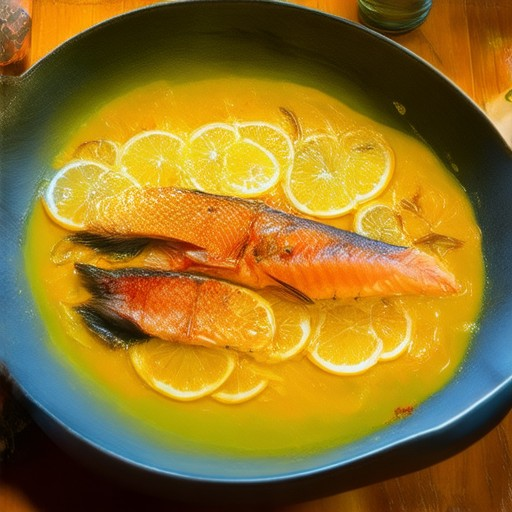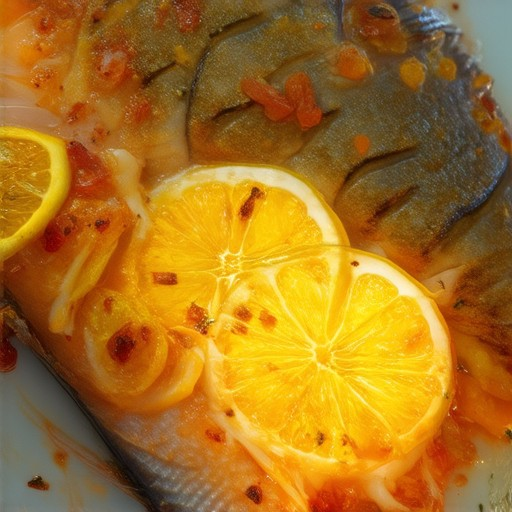Are you curious about the magic of lemon zest in transforming ordinary fish into a flavorful delight? Whether you’re a seasoned cook or new to the kitchen, unlocking the potential of lemon zest fish can elevate your meals to new heights. From enhancing the taste of your favorite fish recipes to offering a healthy twist, lemon zest adds a vibrant burst of flavor that’s hard to resist. In this comprehensive guide, we’ll explore the culinary wonders of lemon zest fish, including its health benefits, versatile uses in recipes, and tips for incorporating it into your cooking. Discover how lemon zest can take your fish dishes from bland to brilliant and become a master of this versatile ingredient.

Is Lemon Fish Good to Eat?
Yes, lemon fish is generally safe to eat and can be a delicious and healthy option. The acidity of lemon juice adds a bright flavor to fish, enhancing its taste and making it a popular ingredient in various recipes. Here’s a breakdown of the key aspects:
- Safety : Consuming fish marinated in lemon juice is safe and does not pose health risks, assuming it is consumed in moderation and not left for extended periods, which could lead to spoilage.
- Health Benefits :
- Vitamin C Boost : Lemon juice is rich in vitamin C, which supports immune function and may help protect against oxidative stress.
- Antioxidants : Lemons contain antioxidants that can contribute to overall health and may reduce the risk of certain diseases.
- Digestive Aid : Some people find lemon juice helps aid digestion due to its citric acid content, which can stimulate saliva production and promote comfortable digestion.
- Flavor Enhancement : The acidic nature of lemon juice balances the natural oils in fish, creating a fresh and tangy taste that complements many fish varieties.
- Culinary Uses :
- Marinades : Lemon juice is a common ingredient in marinades, helping tenderize meat and seafood while adding flavor.
- Ceviche Preparation : In ceviche, raw fish is “cooked” in the acid of lemon juice, creating a unique texture and taste.
- Dressing and Garnish : Lemon juice is often used as a dressing for salads or as a garnish for grilled fish dishes.
- Potential Downsides :
- Acidity Sensitivity : Those with a sensitive stomach may experience discomfort from the acidity.
- Fish Quality : Proper handling and storage are crucial to prevent contamination or spoilage, regardless of seasoning.
For the best results, pair lemon-dressed fish with complementary sides like rice, vegetables, or crusty bread. Looking for more fish recipe ideas? Check out our fish cooking guides for inspiration. Want to learn more about seafood nutrition? Explore our nutritional guide .
What Does Adding Lemon to Fish Do?
Adding lemon to fish enhances the flavor, texture, and nutritional profile of the dish. Here’s a breakdown of its effects:
- Flavor Enhancement : Lemon juice introduces acidity, which brightens the dish and balances the natural flavors of the fish. It can transform a bland tasting fish into a more vibrant and refreshing meal.
- Textural Benefits : The acid in lemon juice may help tenderize the fish muscles, making it more succulent and easier to digest. This effect is particularly noticeable in lean fish like cod or salmon.
- Masking Off-Flavors : In some cases, lemon can help mask any unpleasant fishy tastes, especially in varieties like tilapia, which can otherwise have a strong flavor.
- Nutritional Boost : Lemon is rich in vitamin C, contributing additional health benefits to the dish. This vitamin supports immune function and may aid in collagen production.
- Complementary Pairing : Lemon pairs well with various seasonings and ingredients commonly used in fish dishes, such as garlic, herbs, and olive oil, creating a harmonious blend of flavors.
- Culinary Tradition : Traditionally, lemon is used in Mediterranean and Italian cuisine to elevate fish dishes, showcasing the versatility of this ingredient in enhancing both taste and presentation.
- Visual Appeal : The bright color of lemon zest and slices adds a visually appealing touch, making the dish more attractive and suggesting freshness.
In summary, adding lemon to fish not only enriches the sensory experience but also contributes to the dish’s nutritional value and aesthetic appeal.

What Fish Pairs Well with Lemon?
Lemon is a versatile ingredient that complements a variety of fish, enhancing their natural flavors through acidity and brightness. Here are some excellent fish pairings that work beautifully with lemon:
- White Fish: Cod, tilapia, halibut, grouper, and snapper are classic choices. Their mild flavor allows lemon to shine, whether sautéed in butter with lemon zest or used in a tangy vinaigrette.
- Saltwater Fish: Salmon and trout are excellent picks. Salmon’s richness pairs well with lemon, while trout’s delicate flavor is complemented by the citrus notes.
- Fatty Fish: Mackerel and sardines are oil-rich fish that hold up well to lemon. Their robust flavors balance perfectly with the sharpness of lemon juice and zest.
- Flaky Fish: Sole, turbot, and flounder are perfect for lemon-based dishes. Their tender texture absorbs the flavors of lemon seamlessly.
- Exotic Options: Mahi-mahi and grouper are great choices, offering a slight sweetness that pairs beautifully with lemon. Try grilling or baking these with a lemon-garlic sauce.
- Alternative Choices: Orange roughy and catfish also work well with lemon, despite their different textures. Catfish, in particular, benefits from a zesty lemon marinade.
To enhance your dish, consider adding lemon zest, garlic, and herbs like thyme or dill to your marinades or sauces. These ingredients elevate the flavor profile of the fish, creating a balanced and refreshing meal.

Why Do Chefs Put Lemon on Fish?
Chefs incorporate lemon into fish dishes for several reasons, each contributing to a balanced and enhanced flavor profile:
1. Enhancing Flavor
Lemon juice and zest add a bright, citrusy note to fish dishes. The acidity of lemon helps cut through the richness of fatty fish like salmon or mackerel, creating a refreshing contrast. This balance makes the dish more appealing to the palate.
2. Balancing Richness
The natural sweetness of fish, particularly in species like cod or halibut, can be overpowering. Lemon’s acidity acts as a counterbalance, preventing the dish from becoming too heavy. This harmony ensures that the delicate flavors of the fish remain prominent.
3. Masking Odors
Some fish may have a mild, slightly sweet aftertaste or a faint off-flavor. Lemon juice effectively masks these imperfections, leaving behind a clean and fresh aroma. This is particularly useful with less fresh fish or those that have been stored for a few days.
4. Aromatic Freshness
The scent of lemon instantly refreshes the kitchen and adds an invigorating element to fish preparation. The vibrant fragrance enhances the overall dining experience, making meals more enjoyable and visually stimulating.
5. Health Benefits
In addition to its culinary uses, lemon is rich in vitamin C, which supports immune function. While this isn’t the primary reason for using lemon in cooking, it adds nutritional value to the dish.
6. Textural Enhancement
When used in marinades or drizzled over cooked fish, lemon juice can tenderize meats and enhance the texture. This property, combined with its flavor benefits, makes lemon a versatile ingredient in fish preparation.
7. Complementary Pairing
Lemon pairs exceptionally well with many herbs and spices commonly used in fish dishes, such as dill, fennel, and thyme. This compatibility amplifies the overall flavor experience, creating a harmonious dish.
8. Preventing Sticking
For those cooking fish on high heat, a lemon-based marinade can prevent the flesh from sticking to the pan, ensuring a moist and evenly cooked result.
By understanding these reasons, chefs can strategically use lemon to elevate their fish dishes, achieving a perfect blend of taste, texture, and aroma.
What Happens When You Put Lemon on Raw Fish?
When you place lemon on raw fish, particularly in a dish like ceviche, the acid from the lemon juice interacts with the proteins in the fish. This interaction, known as denaturation, causes the proteins to unravel, resulting in a softer texture. While it doesn’t cook the fish, it makes the texture more manageable and the fish safer to consume by inhibiting bacterial growth. However, it’s important to note that this method relies on the quality and freshness of the fish to ensure safety.
The process typically involves marinating the fish in lemon juice, allowing the acid to work over time. This not only imparts flavor but also enhances the fish’s ability to absorb other ingredients, creating a vibrant and tangy dish. Variations may include adding herbs, onions, or spices, and the choice of fish can vary, such as shrimp, salmon, or tuna, each offering distinct textures and flavors.
While consuming raw fish treated with lemon can be a safe alternative to fully cooking it, it’s essential to use high-quality, fresh fish and observe proper food safety practices to minimize health risks.

Dressing Fish with Lemon Juice: A Common Practice Explained
Fish are often dressed with lemon juice due to their natural briny flavor from living in seawater. This flavor carries over even after washing and cooking, creating a subtle saltiness that can be balanced with the acidity of lemon juice.
Lemon juice, known for its strong acidic properties, effectively neutralizes the fish’s inherent saltiness, achieving a harmonious flavor profile. This tradition is particularly prominent in cuisines like Mediterranean and Asian, where bright, tangy flavors are highly valued.
Additionally, lemon juice adds brightness to the dish, enhancing its appeal and making it more refreshing. Its vitamin C content may also contribute to perceived health benefits, though this isn’t the primary reason for its use in cooking.
While other acidic ingredients like vinegar or yogurt are sometimes used, lemon juice remains a popular choice due to its availability and traditional association with seafood dishes.
Thus, dressing fish with lemon juice is not just a trend—it’s a well-established method to enhance flavor and balance, making it a staple in many culinary traditions worldwide.




0 Comments